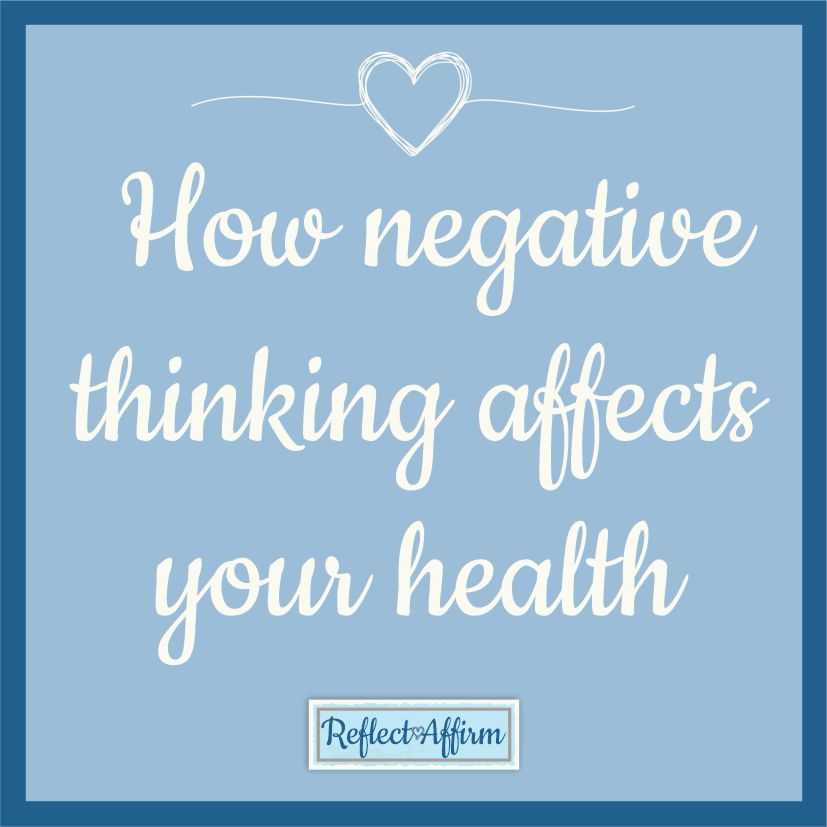Life isn’t always easy. Yet, we make life more challenging with negative thinking. The influence of negative thoughts is far-reaching. There’s no part of your life that escapes. It affects you mentally, emotionally, and physically. It limits your ability to achieve and to enjoy life. There are reasons why pessimists are so miserable. When you stop to consider how negative thinking affects your health, you might start to realize that you need to change your outlook on life.

Do any of these statements sound familiar?
It’s too cold out to take a walk?
Am I good enough for this new position at work?
I should have been more in control when I was dealing with my teenager today.
Did I say the right thing at the dinner tonight?
Many of us at one time or another in our lives have negative thoughts. But when the repeat over and over again, you may start to wonder can negative thoughts affect your health?
Looking at the examples above it can be easy to see how negative thinking affects your health:
It’s too cold out to take a walk? – You listen to your inner voice and don’t get exercise that day.
Am I good enough for this new position at work? – You overwork when you are home to compensate and your blood pressure starts to rise from the stress.
I should have been more in control when I was dealing with my teenager today. – You can’t sleep that night with worry.
Did I say the right thing at the dinner tonight? – Your self-esteem lowers and you turn to food and overeat.
See how negative thoughts can go hand in hand with poor choices regarding your health?
Two Primary Ways that Negative Thinking Affects Your Health
There are 2 primary effects that negative thinking has on your life:
It has a negative impact on your mood and outlook on life.
Negative thinking feels bad. Thinking negative thoughts can make you feel sad, afraid, angry, hopeless, and negative in general. These emotions taint the way you view the world and have a deleterious effect on your ability to make wise decisions.
Negative thinking inhibits your ability to achieve goals.
For any objective, you have things pulling you toward your goal and other things pushing you away. When you think negative thoughts about achieving a goal, you’re much less able to accomplish it.
- Imagine you’d like to explore new work opportunities. A certain job has opened and it always has been a goal of yours. But then you start thinking about it:
- “There are so many new responsibilities, how would I manage?”
- “Am I really prepared for that position?”
- “My job is so easy now, why make my life harder?”
“My co-worker is much more educated than me – how would I measure up?”
“My significant other would have to help more around the house, I don’t want to put any burdens on anyone else.” - All of a sudden, that dream job doesn’t sound so dreamy anymore. Negative thinking makes goals seem harder than they are in reality.
These two negative effects are pervasive. They influence your entire life. But, there are additional consequences as well.
How Does Negative Thinking Affect Your Health on a Daily Basis?
Negative thinking has other consequences that limit your capabilities on a daily basis:
It’s damaging to your health. The stress caused by negative thinking is horrible for your health.
It lowers your self-esteem. When you think you’re ugly, fat, and stupid, you can’t feel very good about yourself.
It reduces your confidence. Negative thoughts about yourself lower your self-confidence. Negative thoughts about others make you less confident in their abilities. Your negative thinking can impact everyone around you.
It saps your energy. Negative thinking is exhausting and saps your resources.

What Does the Research Say on How Negative Thinking Affects Your Health?
Did you know research tells us that repetitive negative thinking can be associated with mental health issues? One study indicated that this type of negative thinking is a risk factor for severity, persistence and relapse of depression and anxiety (Spinhoven et al, 2018).
This type of negative thinking can also influence eating disorders with higher weighing and body checking (Sala et al, 2019).
As we age, repetitive negative thinking can even hurt our cognition. One research study indicated that repetitive negative thinking was associated with decline in global cognition and delayed memory (Marchant et al, 2020).
So can negative thoughts affect your health? Yes, even science tells us that it can!
How to Limit Your Negative Thinking Patterns
Luckily, there are ways to limit your negative thoughts and bring in positivity each day:
Check yourself throughout the day for negative thoughts. Use a timer and perform a check every 15 minutes. Check yourself during your regular daily activities:
- Lying in bed
- Shower
- Driving to work
- Work
- Lunch
- And so on
- When you notice a negative thought, change it to one that’s more positive. For example, you can change the thought, “I hate driving to work” to “Driving sure beats taking the bus. I can listen to my music as loudly as I like.”
- Get into the habit of thinking positive thoughts. Before doing any task, take 15 seconds and think a few positive thoughts about it. The task will be easier and more enjoyable.
- Spend more time with positive people. It’s unlikely that you’ll rise far above the people you spend the most time with. Ensure that the people around you are positive.
Reducing the incidences of negative thinking is one of the most effective ways to spend your time and enhance your life. Negative thoughts can harm your happiness, success, and health. Spend time to ensure that your thoughts are supportive and positive and turn your life around.
Create a positive space. Hang up motivational and positive thoughts on your wall, refrigerator, mirror, and office space. Anywhere that you can look to for positive support through out the day.
Use Positive Affirmations
Now that you know how negative thinking affects your health, try changing your daily habits. Start with these two positive affirmations.
I am stronger than my negative thoughts.
I have excellent control over my thoughts, but sometimes I still experience negative thoughts. I accept that having a few negative thoughts is normal. A few negative thoughts are okay because I know that I can overcome them. I am stronger than my negative thoughts.
I avoid thinking negative thoughts, but when they do occur, I choose to override them.I know what I need to accomplish, and I accomplish those things despite any negative thoughts I might have.
I know that I have a choice, regardless of any negative thoughts.
Many people allow their negative thoughts to derail their plans. I am stronger than this. I have the strength to continue even when I feel doubt or uncertainty.
I know that negative thoughts are usually false, so I can easily dismiss them. I use my logic to make wise decisions, and I stick with those decisions.
My emotional strength is growing by leaps and bounds. My mental strength allows me to do things others are afraid to even try. My negative thoughts are easily overwhelmed by my inner strength.
Today, I am only allowing myself to have positive thoughts. I choose to ignore any negative thoughts I might have today. I am stronger than my negative thinking. I can choose to have positive thoughts today.
Self-Reflection Questions on How Negative Thoughts Affect Your Health:
What impact do negative thoughts have on my life? What would happen if I were strong enough to overcome them?
When have I come up short because of negative thinking?
What would my life look like if I were mentally stronger?
My mind is filled with positive thoughts.

My mind only allows positive and nourishing thoughts to exist. I naturally have a positive attitude and think positive thoughts.
Negative thinking is against my basic nature. I feel like I am being untrue to myself when I have negative thoughts.
Negative thoughts are quickly banished from my mind. I notice negative thoughts very quickly. I am able to redirect my focus to positive thoughts before negative thoughts can take hold.
I am an expert at thinking positive thoughts and avoiding negative thoughts. I know that I have the power to focus my attention and my thoughts as I see fit.
Good thoughts lead to good outcomes. Good thoughts result in a good mood. There are so many benefits to positive and nourishing thoughts that the idea of a negative thought is repulsive to me.
I believe in myself, and my thoughts represent that attitude. I am supportive of myself. I engage in positive self-talk. I focus on solutions rather than challenges. I notice my strengths more than my weaknesses. I think thoughts that support my life and goals.
Today, I release my negative thoughts and only allow positive thoughts to exist in my mind. As a result, I feel happy and expect good things to happen. My mind is filled with positive thoughts.
Self-Reflection Questions following Positive Thoughts Affirmation:
How does negative thinking affect my health? What are the most common negative thoughts I have?
How would I rate my self-talk? How would my life change if I only engaged in positive self-talk?
If my expectations for my life were positive, would that change my life or my behavior? If so, how?
Summary on How Negative Thinking Affects your Health
Negative thinking has a real, measurable impact on your health status. Shift your mindset today and take the steps necessary to reduce negative thinking and increase positive self-talk to improve your mental and physical health.
References:
Marchant, N. L., Lovland, L. R., Jones, R., Pichet Binette, A., Gonneaud, J., Arenaza‐Urquijo, E. M., … & PREVENT‐AD Research Group. (2020). Repetitive negative thinking is associated with amyloid, tau, and cognitive decline. Alzheimer’s & Dementia, 16(7), 1054-1064.
Sala, M., Brosof, L. C., & Levinson, C. A. (2019). Repetitive negative thinking predicts eating disorder behaviors: A pilot ecological momentary assessment study in a treatment seeking eating disorder sample. Behaviour research and therapy, 112, 12-17.
Spinhoven, P., van Hemert, A. M., & Penninx, B. W. (2018). Repetitive negative thinking as a predictor of depression and anxiety: A longitudinal cohort study. Journal of Affective Disorders, 241, 216-225.





